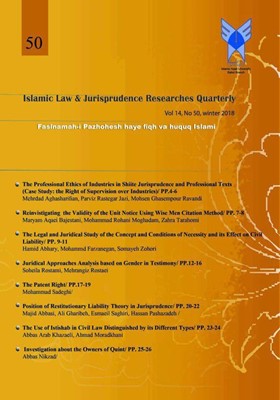-
-
List of Articles
-
Open Access Article
1 - The Professional Ethics of Industries in Shiite Jurisprudence and Professional Texts (Case Study: the Right of Supervision over Industries)
Mehrdad Aghasharifian Parviz Rastegar Jazi Mohsen Ghasempour Ravandi -
Open Access Article
2 - Reinvistigating the Validity of the Unit Notice Using Wise Men Citation Method
Maryam Aqaei Bajestani Mohammad Rohani Moghadam Zahra Trahomi -
Open Access Article
3 - The Legal and Juridical Study of the Concept and Conditions of Necessity and its Effect on Civil Liability
Hamid Abhary Mohammad Farzanegan Somayeh Zohori -
Open Access Article
4 - Juridical Approaches Analysis based on Gender in Testimony
soheila Rostami merangez rostaei -
Open Access Article
5 - The Patent Right
Mohammad Sadeghi -
Open Access Article
6 - Position of Restitutionary Liability Theory in Jurisprudence
majid abbasi Ali Gharibeh Esmaeil Saghiri Hassan Pashazadeh -
Open Access Article
7 - The Use of Istishab in Civil Law Distinguished by its Different Types
Abbas Arab Khazaeli Ali Reza Asgari Ahamd Moradkhani -
Open Access Article
8 - An Investigation about the Owners of Quint
Abbas Nikzad
-
The rights to this website are owned by the Raimag Press Management System.
Copyright © 2021-2025







